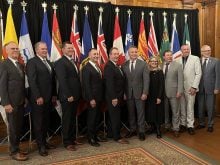The provincial NDP has rural Manitoba, including traditional Progressive Conservative (PC) strongholds, in their crosshairs as parties start showing their hands ahead of this year’s election.
In a March 1 release, Manitoba NDP leader Wab Kinew took specific aim at rural health care.
“It’s clear that things are getting worse in rural Manitoba, not better, under Premier Stefanson,” the statement read. “Wait times for EMS are skyrocketing, rural ERs are closing, and seniors are being transferred from their home communities just to access health care.”
Read Also

Horse live export ban on back burner
Animal welfare groups still hope Canada’s Parliament will ban the export of live horses for slaughter, a topic back in the news due to a recent court case in Manitoba.
The release coincided with the first day of the Legislature’s final sitting before the next election, scheduled for Oct. 2 of this year.
Why it matters: The NDP smell blood in the water, but they’ll have to win over at least some of rural Manitoba if they hope to de-rail the PC winning streak.
The NDP’s salvo on rural health care cited emergency room closures in Eriksdale and Glenboro, as well as paramedic pay rates. The party said they would, “continue to push the PCs to fix EMS wait times by paying rural paramedics competitive wages and allowing them to work to the full scope of their practice.”
The PCs did increase health care funding in the 2023 budget, released March 7. The plan includes a $1.2-billion multi-year capital campaign to add capacity to nine healthcare facilities, several of which are in rural Manitoba.
Premier Heather Stefanson is facing an uphill battle as the election date approaches. A third of her caucus has indicated they will not be running in the coming election, while polls have shown deflating support.
The firm’s latest voter intention poll from December 2022, showed a six-point decrease in PC support in areas outside of Winnipeg compared to data from September 2022. Although still floating above the NDP in those regions, the party went from 55 per cent of committed voters down to 49 per cent. The NDP rose from 31 to 32 per cent, while the Liberals and Greens also saw increases of two and three per cent, respectively.
Probe Research principal Curtis Brown said that, while the drop in support in rural Manitoba might be concerning to conservative strategists, it’s too early to call it a trend.
“To go from 55 to 49 per cent is not hugely alarming,” Brown said.
“If it suddenly dropped to 43 per cent in the next poll, that would be worrying,” he also said. “That would be a trend.”
As it stands, the PCs remain strong in rural Manitoba. “They should be in a pretty good position to win most of those rural seats,” Brown said.
Nevertheless, it’s not surprising to see the NDP making a push into rural Manitoba.
The majority of the seats in the province are in Winnipeg. Theoretically, a party could form a government with no seats outside the perimeter, but the Liberal/NDP split in Winnipeg, as well as some areas of the capitol where the PCs are competitive, make that unlikely.
“Anytime the NDP has formed government in Manitoba, they’ve taken seats in rural central and southern Manitoba,” said Brown.
The NDP has a fairly strong hold on the four northern seats.
The NDP recovered significantly in the last election from their showing in 2016, which saw them reduced to 14 seats in the Legislature. But while they made gains in the suburbs of Winnipeg, they struggled to reach the levels of support they once had in other regions.
“They still lost a lot of seats that they held previously in rural areas by quite a bit,” Brown said. “So, I think they have to emphasize what they’re doing to support rural Manitoba. It’s not surprising that they’re trying to make a pitch outside the city.”
According to the December poll, the NDP led the PCs by 11 points (46 to 35 per cent) province-wide, with the Liberals at 13 per cent.
Probe Research will be putting out another poll in late March, and Brown says they’re keeping a close eye on the race outside of Winnipeg.
“For the Conservatives [PCs] to be able to hang on to government, they’ll have to be pretty strong to hold on to those more traditional NDP seats,” he said.


















